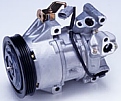|
The
variable displacement compressor has a swash plate that
rotates to reciprocate pistons, which compresses refrigerant.
The variable displacement compressor change the swash plate
angle to change the refrigerant displacement.
The externally controlled type
variable displacement compressor changes the swash plate angle
in accordance with an electrical signal from an electric
control unit. displacement compressor change the swash plate
angle to change the refrigerant displacement.
The externally controlled type
variable displacement compressor changes the swash plate angle
in accordance with an electrical signal from an electric
control unit.
Denso’s
externally controlled variable displacement compressor manages
displacement by controlling refrigerant differential pressure
before and after a throttle at the discharge side; achieving
precise cooling capability control in accordance with cabin
environment and driving conditions.
|
Technology
Denso developed the first technology that controls refrigerant displacement
from almost zero percent to 100 percent. Using this technology, in
1997, DENSO launched the first externally controlled variable
displacement compressor with a damper limiter (DL) pulley, instead of
a magnetic clutch, making the compressor smaller, lighter and more
reliable.
In 2001,
Denso launched the first externally controlled variable
displacement compressor with an electromagnetic control valve that
controls refrigerant differential pressure before and after a throttle
at the discharge side, in accordance with an electric signal from the
engine ECU or air conditioner ECU. By controlling refrigerant
discharge pressure rather than refrigerant suction pressure, the
engine torque used for the compressor can be estimated. This allows
the compressor to be controlled in connection with engine management
to reduce fuel consumption.
In 2001, Denso
launched an even lighter variable displacement compressor with a
resin-made DL pulley.
In 2003, Denso
launched the first externally controlled variable displacement
compressor with a rotary valve as a suction valve, instead of a
conventional lead valve plate. This improved compressor efficiency by
approximately 10 percent.
Benefits and Features
Small size and
light weight
The externally
controlled variable displacement compressor (5SER09) with resin-made
DL pulley achieves the lightest weight for equivalent
displacement compressors.
Denso improved the housing to have a thinner wall while maintaining
its strength, contributing to a smaller and lighter compressor.
High compressor
efficiency
The rotary valve
reduces pressure drop of refrigerant gas drawn into compression
chambers, and prevents heating of the refrigerant gas. This enables
the compressor to draw a larger amount of refrigerant into the
compressing chambers, increasing compressor efficiency by
approximately 10 percent when compared to a conventional compressor.
Precisely
controllable in connection with engine management
Using
Denso developed electromagnetic control valve, refrigerant
displacement is controlled in accordance with the amplitude of engine
torque used for the compressor. This maximizes engine efficiency.
Low noise and
vibration
The rotary valve
and the housing’s muffler structure significantly reduce the pulsation
of refrigerant gas pulled into the compression chambers.
High reliability
The pistons are
hollow, enabling the compressor to control refrigerant displacement at
a maximum of 11,000 revolutions per minute, at high engine speed. This
prevents the pistons from disturbing the swash plate inclination
control even at the high engine speed.